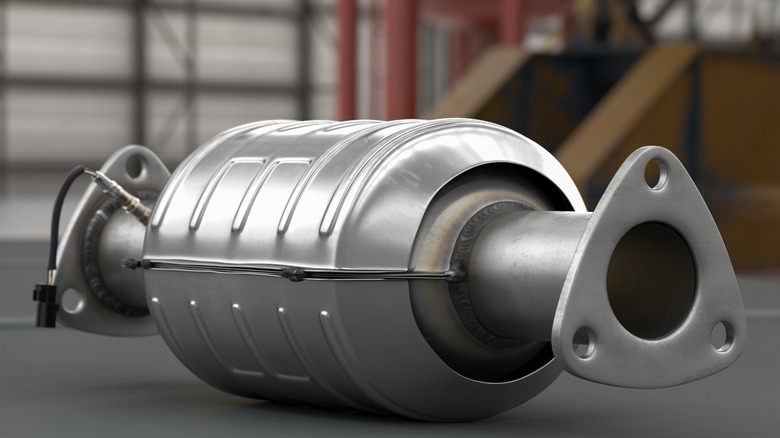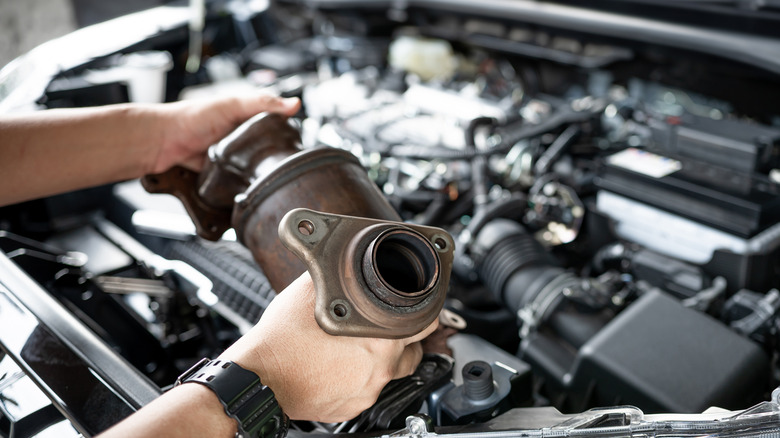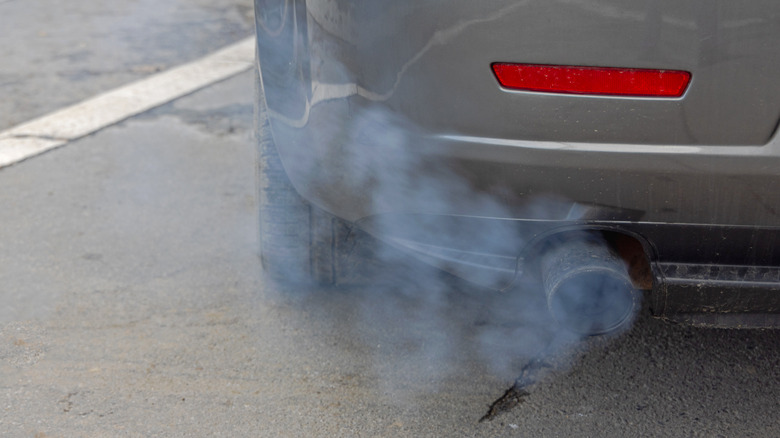Buying A Refurbished Catalytic Converter? Here's What Could Go Wrong
Catalytic converters are an essential part of a road car's exhaust system, converting noxious emissions into more environmentally friendly gases. Unfortunately, while they're useful, they aren't infallible. For one, they're often stolen from exhausts. Even if they're not, catalytic converters can go wrong, not least because they're constantly subjected to the wear and tear inherent to running a car every day. So what happens if your catalytic converter falls apart? One solution is to spring for a refurbished unit, particularly useful if you're on a budget or if your car doesn't have new parts available.
There's nothing wrong with buying refurbished parts, catalytic converters included, provided they're refurbished correctly. And therein lies the issue: sometimes it simply isn't refurbished correctly. Catalytic converters can be damaged by road abuse, corrosion, or general mileage, and the various baffles and failure points in a converter mean that it's possible to inherit one that already has unresolved issues, further detracting from its service life.
Additionally, engine issues can cause a catalytic converter to fail, and not addressing them will simply cause a replacement catalytic converter to go bad, be it new or refurbished. Moreover, a refurbished unit likely won't cope with engine faults as well, either, due to the miles already put on it and those stress points being weaker. So what specific issues should you look out for, and are there ways of preventing this? Let's discuss.
Issues that lead to catalytic converter failure
A catalytic converter is, for all intents and purposes, an exhaust filter. It features a honeycomb structure inside it which filters particulates, converting the harmful gases through the use of a catalyst such as platinum, hence the name. However, this system can wear out over time; it relies on various external factors to work correctly, most importantly, the exhaust itself. A contaminated exhaust from an engine burning oil or running too rich, for instance, will clog up that honeycomb structure and prevent gases from flowing effectively. In other words, if your car's engine isn't running well, the exhaust will likely also damage or prematurely wear out the catalytic converter as a secondary issue.
The problem with buying a refurbished catalytic converter (or a new one, for that matter), therefore, is that if the source problem isn't resolved, it'll likely damage the converter again. Moreover, because metal expands and contracts when subjected to heat variations over time, these parts naturally wear out, as anyone who has needed new exhaust components can vouch for. Catalytic converters can even overheat if subjected to high enough temperatures, creating or exacerbating various problems.
Typical secondary effects of a catalytic converter failure include failing emissions tests, strange smells, a check engine light due to the exhaust being different than expected, and a minor loss of performance. Additionally, you'll know if it totally fails because you'll hear a rattling sound coming from the exhaust; that's the honeycomb detached from the housing just bouncing around on its own.
Making sure you avoid catalytic converter issues
Given that new catalytic converters can cost upwards of $2,000 or more, this represents one of the most important areas of preventative maintenance on a car if you're not interested in burning a hole in your wallet. Generally speaking, if your catalytic converter was stolen and was in good shape beforehand, you likely won't have any issues with a refurbished unit. The main problems with refurbs as a whole come from two main factors: who refurbished the item and the overall condition of the vehicle it's going in.
Therefore, the best way to avoid the dreaded check-engine light is to make sure that the car's exhaust isn't damaging the catalytic converter in the first place. It may cost more, but then again, so does finding another catalytic converter. Corroded pipes, fouled spark plugs, premature detonation (also known as "knocking"), and valvetrain issues, to name a few, affect the exhaust quality and flow, and therefore the catalytic converter. If you're having to replace your catalytic converter because it's damaged, these are good areas to start checking to find the source of your problem.
Lastly, always go to a reputable shop and purchase a quality refurb, or do it yourself if you're so inclined. Bear in mind, however, that improper installation or servicing of the can lead to premature failure of refurbished parts, catalytic converters included.


